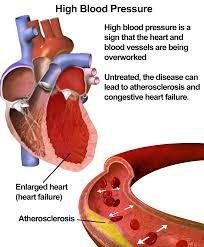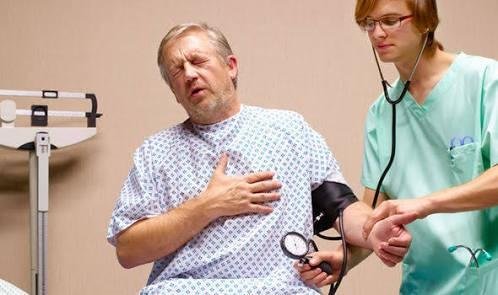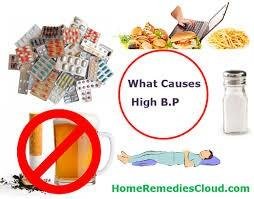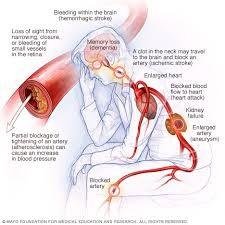what you must know about high blood pressure
High blood pressure is also known as hypertension. Blood pressure is the amount of force exerted against the walls of the arteries as blood flows through them. In the United States, approximately 85 million people have high blood pressure - about 1 in every 3 adults over 20, according to the American Heart Association (AHA). The National Institutes of Health (NIH) estimate that about two-thirds of people over the age of 65 in the U.S. have high blood pressure. If left untreated or uncontrolled, high blood pressure can cause many health problems. These conditions include heart failure , vision loss, stroke, and kidney disease. Causes The heart is a muscle that pumps blood around the body. Blood that has low oxygen levels is pumped towards the lungs, where oxygen supplies are replenished. ( )
)
The oxygen rich blood is then pumped by the heart around the body to supply our muscles and cells.
( )
)
The pumping of blood creates pressure. If a person has high blood pressure, it means that the walls of the arteries are receiving too much pressure on a constant basis. The causes of high blood pressure are divided into two categories:
( )
)
Essential high blood pressure: This has no established cause. Secondary high blood pressure: There is an underlying cause. Even though there is no identifiable cause for essential high blood pressure, there is strong evidence linking some risk factors to the likelihood of developing the condition. Most of the causes below are risk factors for essential high blood pressure. There are also examples of secondary high bloodpressure
( )
)
Age The older you are the higher your risk of having high blood pressure.
Family history If you have close family members with hypertension , your chances of developing it are significantly higher. An international scientific study identified eight common genetic differences that may increase the risk of high blood pressure.
Temperature A study that monitored 8,801 participants over the age of 65 found that systolic and diastolic blood pressure values differed significantly across the year and according to the distribution of outdoor temperature. Blood pressure was lower when it got warmer, and rose when it got colder.
Ethnic background Evidence indicates that people with African or South Asian ancestry have a higher risk of developing hypertension, compared to people with predominantly Caucasian or Amerindian (indigenous of the Americas) ancestries.
Obesity and overweight Both overweight and obese people are more likely to develop high blood pressure, compared to people of normal weight.
Some aspects of gender In general, high blood pressure is more common among adult men than adult women. However, after the age of 60 years both men and women are equally susceptible.
Physical inactivity Lack of exercise, as well as having a sedentary lifestyle, raises the risk of hypertension.
Smoking Smoking causes the blood vessels to narrow, resulting in higher blood pressure. Smoking also reduces the blood's oxygen content so the heart has to pump faster in order to compensate, causing a rise in blood pressure
Alcohol intake People who drink regularly have higher systolic blood pressure than people who do not, according to researchers. They found that systolic blood pressure levels are about 7 millimeters of mercury (mmHg) higher in people who drink frequently than in people who do not drink.
High salt intake Researchers reported that societies where people do not eat much salt have lower blood pressures than places where people eat a lot of salt.
High fat diet Many health professionals say that a diet high in fat leads to a raised high blood pressure risk. However, most dietitians stress that the problem is not how much fat is consumed, but rather what type of fats. Fats sourced from plants such as avocados, nuts, olive oil, and omega oils are good for you. Saturated fats, which are common in animal-sourced foods, as well as trans fats, are bad for you.
Mental stress Various studies have offered compelling evidence that mental stress, especially over the long term, can have a serious impact on blood pressure. One study suggested that the way that air traffic controllers handle stress can affect whether they are at risk of developing high blood pressure later in life.
Diabetes People with diabetes are at a higher risk of developing hypertension. Among people with type 1 diabetes , high blood sugar is a risk factor for incident hypertension - effective and consistent blood sugar control, with insulin, reduces the long-term risk of developing hypertension. People with type 2 diabetes are at risk of hypertension due to high blood sugar, as well as other factors, such as overweight and obesity , certain medications, and some cardiovascular diseases.
Psoriasis A study that followed 78,000 women for 14 years found that having psoriasis was linked to a higher risk of developing high blood pressure and diabetes. Psoriasis is an immune system condition that appears on the skin in the form of thick, red scaly patches.
Pregnancy Pregnant women have a higher risk of developing hypertension than women of the same age who are not pregnant. It is the most common medical problem encountered during pregnancy, complicating 2 to 3 percent of all pregnancies. Signs and symptoms Most people with high blood pressure will not experience any symptoms. It is often known as the "silent killer" for this reason. However, once blood pressure reaches about 180/110 mmHg, it is considered a medical emergency known as a hypertensive crisis. At this stage, symptoms will show, including: headache nausea vomiting dizziness blurred or double vision nosebleeds. palpitations, or irregular or forceful beating of the heart breathlessness Anybody who experiences these symptoms should see their doctor immediately. Children with high blood pressure may have the following signs and symptoms: headache fatigue blurred vision nosebleeds Bell's palsy, or an inability to control facial muscles on one side of the face. Newborns and very young babies with high blood pressure may experience the following signs and symptoms: failure to thrive seizure irritability lethargy respiratory distress People who are diagnosed with high blood pressure should have their blood pressure checked frequently. Even if yours is normal, you should have it checked at least once every five years, and more often if you have any contributory factors. Complications If the hypertension is not treated or controlled the excessive pressure on the artery walls can lead to damage of the blood vessels (cardiovascular disease), as well as vital organs. The extent of damage depends on two factors; the severity of the hypertension and how long it goes on for untreated. Below is a list of some of the possible complications of high blood pressure: stroke heart attack and heart failure blood clots aneurysm kidney disease thickened, narrow, or torn blood vessels in the eyes metabolic syndrome brain function and memory problems (
 )
)
Hi! I am a robot. I just upvoted you! I found similar content that readers might be interested in:
https://www.medicalnewstoday.com/articles/159283.php